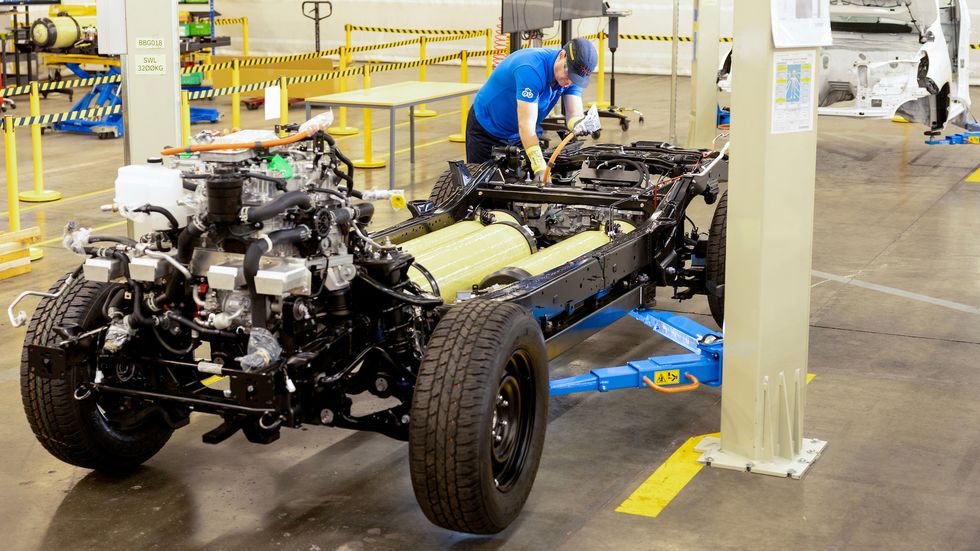- Toyota UK reveals Hilux pickup truck prototype with a hydrogen fuel-cell powertrain borrowed from the Mirai sedan.
- The converted Hilux prototype, with three high-pressure hydrogen fuel tanks, offers a range of 365 miles.
- Toyota has been developing hydrogen fuel-cell vehicles, as well as hybrids, PHEVs, and battery-electric vehicles simultaneously, but has been characterized as being an EV holdout until very recently.
Toyota may have rolled out its newest mass-market EVs, but it’s not giving up its hydrogen dream. The automaker’s UK arm took the wraps off a Hilux pickup this week, with hardware borrowed from the Mirai sedan, showcasing its hydrogen fuel-cell technology.
Built by Toyota Manufacturing UK at the Burnaston vehicle plant in Derby, the Hilux features three high-pressure hydrogen fuel tanks coupled with a battery and electric motors, giving the truck a range of 365 miles, which is “significantly further than might be achieved with a battery electric system,” according to the automaker.
As such, the Hilux used the experience gained from almost a decade of Mirai sedan production, which currently offers a range of up to 402 miles on a full tank, provided you’re within range of a hydrogen station.
The Hilux prototype was built by a consortium composed of Toyota Motor Europe along with Ricardo, ETL, Thatcham Research, and D2H Advanced Technologies. The project kicked off in 2022, but construction began on June 5 of this year, with the team completing the prototype over the course of just three weeks.
Ricardo will now embark on a complete evaluation of the truck in the next few months.
“The project team have accomplished an incredible job in a very short space of time, from creating the prototype build area to completion of the first vehicle,” said Richard Kenworthy, Toyota Motor UK Managing Director.
Of course, this project could be viewed as some complex and expensive plumbing just to power a Hilux pickup with an exotic fuel, at a time when EV trucks are hitting the market.
While there’s no danger of a hydrogen fuel-cell Hilux appearing on US shores anytime soon, Toyota could fit such a powertrain to the Tacoma with some work, at least in theory.
The main question is whether there would be demand for such a truck even in those parts of California that actually are within driving distance of a hydrogen station.
Toyota is betting on hybrid, battery-electric, plug-in hybrid, and hydrogen fuel-cell vehicles in the coming years, but it’s the automaker’s fuel-cell investments over the past several years that have raised the most eyebrows.
Amid a turn to electrification by a number of its competitors, some industry watchers have wondered whether Toyota’s continued work on hydrogen fuel-cell drivetrains is worthwhile in the near term.
This Hilux prototype has certainly demonstrated Toyota’s ability to apply its know-how to existing internal-combustion models.
“The UK Government funding has enabled us not only to develop a new vehicle in record time, but also to upskill our teams to work on hydrogen-related technologies, something we hope to build on in the future,” Kenworthy added.
The door appears to be open for the development of hydrogen pickups and other vehicles. But Toyota is certainly facing increased calls for more EVs, at least in some markets.
Should Toyota continue developing hydrogen fuel-cell tech, or focus on EVs in the near future? Let us know what you think in the comments below.

Jay Ramey grew up around very strange European cars, and instead of seeking out something reliable and comfortable for his own personal use he has been drawn to the more adventurous side of the dependability spectrum. Despite being followed around by French cars for the past decade, he has somehow been able to avoid Citroën ownership, judging them too commonplace, and is currently looking at cars from the former Czechoslovakia. Jay has been with Autoweek since 2013.
Read the full article here



